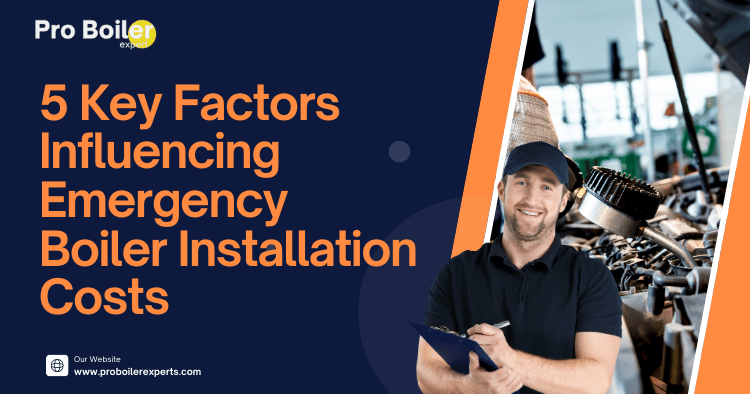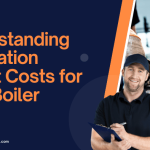Table of Contents
- Introduction
- 1. Type of Boiler
- 2. Location of Installation
- 3. Labor Costs
- 4. Accessibility Issues
- 5. Time of Installation
- FAQs
- Conclusion
Introduction
When your boiler breaks down unexpectedly, it can be a source of stress and confusion. In addition to the inconvenience of being without hot water or heating, you may also wonder about the costs associated with emergency boiler installation. Understanding the factors that influence these costs can help you make informed decisions during a stressful time. In this article, we will explore five key factors that affect emergency boiler installation costs, enabling you to budget effectively and choose the right service for your needs.
1. Type of Boiler
The type of boiler you choose plays a significant role in determining installation costs. Here’s a breakdown of the common types of boilers and their implications for installation:
| Boiler Type | Average Cost Range | Notes |
|---|---|---|
| Combi Boiler | $1,500 – $3,500 | Compact and efficient; ideal for smaller homes. For more benefits of combi boilers, check out our article on Top 5 Benefits of Choosing Combi Boilers for Your Home. |
| System Boiler | $1,800 – $4,000 | Works well for larger homes; requires a hot water cylinder. Learn more about system boilers in our guide on Top 5 Benefits of Choosing a System Boiler for Your Home. |
| Regular Boiler | $1,500 – $3,000 | Best for homes with multiple bathrooms; needs a cold water tank. Explore the advantages of regular boilers in our article on Top 5 Benefits of Conventional Boilers for Your Home. |
Different boiler types have varying complexities in installation. For example, a combi boiler might be less expensive to install because it doesn’t require additional tanks, while a regular boiler might involve more extensive plumbing work.
2. Location of Installation
The geographical location of your home can influence emergency boiler installation costs significantly. Urban areas typically have higher labor rates due to the cost of living, while rural areas might offer more competitive prices. Here are some factors to consider:
- Regional Price Variations: Some states or cities have higher overall costs due to demand. For instance, cities like San Francisco or New York may charge more for labor compared to smaller towns.
- Local Regulations: Some areas may have stricter building codes, which could lead to increased installation costs due to additional permits or inspections. For detailed insights into installation processes, refer to our article on Essential Permits for Boiler Installation Process.
For a deeper understanding of how regional differences can impact costs, check out HomeAdvisor’s Cost Guide for local trends.
3. Labor Costs
Labor costs are a substantial part of your emergency boiler installation bill. These costs can vary based on several factors:
- Experience of Technicians: Highly skilled and certified professionals may charge more but could save you money in the long run by ensuring the installation is done correctly.
- Emergency Rates: Emergency services often come with a premium price tag. Expect to pay more if you require installation during off-hours, weekends, or holidays.
It’s essential to get quotes from multiple service providers to understand the labor costs in your area fully. Websites like Angie’s List can help you find reputable contractors and compare prices.
4. Accessibility Issues
The physical layout of your home can also affect installation costs. If your boiler is in an awkward location, such as a cramped basement or high up in an attic, it may require more time and effort to install. Here are some factors to consider:
- Space Constraints: Limited space may necessitate additional tools or techniques, which can drive up labor costs.
- Existing Infrastructure: If your current plumbing or heating systems need modifications to accommodate the new boiler, this can lead to additional expenses.
Always communicate any accessibility concerns with your technician beforehand. They can advise you on potential challenges and provide a more accurate quote.
5. Time of Installation
The urgency of your installation can significantly impact the overall cost. Emergency installations typically command higher fees than standard installations due to the need for immediate service. Consider the following:
- Peak Seasons: Boiler breakdowns are more common during winter months, leading to increased demand for emergency services, which can raise prices. To learn about cost-saving strategies during peak seasons, check our guide on Top Energy Efficiency Tips for Boiler Installation.
- Time of Day: If you call for emergency service late at night or during weekends, you may face higher rates.
Planning for a boiler replacement or maintenance during off-peak seasons can save you money.
FAQs
Q: What is the average cost of emergency boiler installation?
A: The average cost can range from $1,500 to $4,000, depending on the factors mentioned above.
Q: How can I reduce my installation costs?
A: Consider scheduling installations during regular business hours, comparing multiple quotes, and opting for a less complex boiler type.
Q: Do I need a permit for boiler installation?
A: Many regions require permits for boiler installation. Check with your local building authority for specific requirements.
Q: How long does the installation process take?
A: Most installations can be completed within a few hours, but complex situations may take longer.
Conclusion
Understanding the factors influencing emergency boiler installation costs can empower you to make informed choices when faced with a breakdown. From the type of boiler to labor costs, each element plays a critical role in determining your final bill. By planning ahead and considering your options, you can mitigate stress and manage costs effectively. Always consult with professionals, ask questions, and don’t hesitate to seek multiple quotes to ensure you get the best service for your investment.
For more information on boiler installation and maintenance, visit the U.S. Department of Energy for authoritative resources. Additionally, explore our articles for more insights on different boiler types and their benefits, such as Top 5 Benefits of Condensing Boilers You Should Know and Top 5 Benefits of Biomass Boilers for Eco-Friendly Heating.




